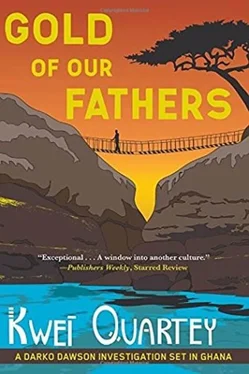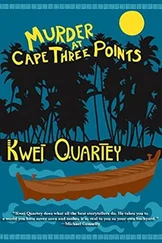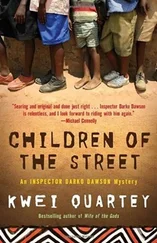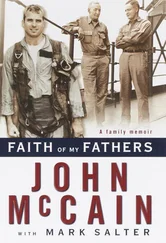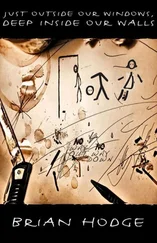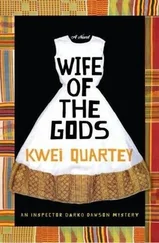Longdon was angry. “This is ignorance,” he snapped at Dawson. “You have no idea what you are saying. How dare you speak out of turn? Have I ever discussed any issue of police informants with you?”
“No, sir,” Dawson admitted.
Longdon glared at him for a moment before turning to Dzamesi. “I apologize, Commissioner. Mr. Dawson wasn’t authorized to make that nonsensical statement. Kindly disregard.”
“But wait just a moment,” Manu said, leaning forward and looking at Dawson intensely. “I would like us to talk about this a little more because a similar thought has occurred to me now and again. Chief Inspector, what exactly do you mean by informants?”
“Madam, if the Chinese are escaping just before a raid, I fear that someone within the force is feeding them information about the date and time such raids are to occur.”
Manu was fingering her chin. “Do you know of any informants specifically?” she asked him. “Is that why you’ve brought this up?”
“I can’t name any,” Dawson said. “Not yet.”
Dawson stole a glance at Longdon. His face had turned to stone.
“We will take note of what you have said, Chief Inspector,” Dzamesi said self-importantly, jotting something down on his pad. “For now, let us discuss some of the operations that we will be carrying out.”
Manu, still not satisfied, cut in yet again. “Commissioner Dzamesi, I’m sorry to interrupt, but I don’t believe we’ve quite settled the matter. If informants exist, they pose a significant obstacle to our getting the Chinese galamsey activities under control, and we need to pursue the issue.”
“‘We,’ meaning the task force?” the commissioner asked impatiently.
“Why not?” Manu said with a shrug. “I suggest that it should be incorporated into the mission statement of the task force-with the president’s endorsement, of course.”
“I understand your concern, Manu,” Dzamesi said quietly, “but such probes generate ill feeling in the force and have a detrimental effect on morale. I will bring it up with the inspector general of police, but I don’t think it should be the business of this task force.”
Worthless lip service , Dawson thought. He will never take up the matter with the IG.
“Very good, sir,” Manu said respectfully, but Dawson knew she was not pleased by Dzamesi’s response.
“So,” the commissioner continued, “our main task at hand is uprooting these illegal Chinese miners. We will be concentrating first on the mines in a wide area around Dunkwa. Within the next few days, officers with the police SWAT Bravo Strike Force here in Kumasi will join the brigadier-general’s forces and conduct a raid at those sites. On an almost weekly basis, we plan to move farther north to areas like Obuasi, Aniamoa, Ntoburoso, and so on.”
Dzamesi looked up for responses, and a short discussion followed. When a space opened up in the chatter, Dawson said, “Please, sir, what will be my role during these raids?”
Dzamesi was taken by surprise. He looked at DCOP Manu, who in turn looked at Longdon. “Do you usually send your detectives on such raids?” she asked.
The commander shook his head. “For safety reasons, we do not.”
“That seems sensible,” the commissioner commented.
“Is this not a special case, though?” Manu came in. “The chief inspector has been investigating the death of a Chinese man at one of the illegal mining sites that will be included in the upcoming raids. I would say that, in fact, it’s imperative that he be in attendance.”
“Why?” the brigadier-general demanded, frowning.
Let’s see how she handles this , Dawson thought, with growing admiration.
“Not only must Mr. Dawson witness this raid in order to make his final investigatory report complete,” Manu said confidently, “he has gathered some very useful and specialized knowledge about these miners and the galamsey sites. For example, the chief inspector knows how many workers were at the mine where the Chinese man died, and he knows their names. This is important because we might have to question some of the people we round up, and Mr. Dawson can assist with this. Correct me if I’m wrong, but the goal of these raids is not just to uproot and terrify people. Are we not also seeking information?”
“That is true,” Dzamesi conceded with hesitation.
“Right,” Manu said. “In addition, the chief inspector has familiarized himself with the workers in the adjacent mine, which belongs to the American, Chuck Granger. This is detailed information that we don’t have, and I suggest that it would be valuable at the time of the raids.”
Some muttering and throat clearing took place. Dzamesi finally answered heavily, “All right. Chief Inspector Dawson can be involved in the raid in observation status only.” He looked at Dawson sternly. “I want to make that clear. You will not play any active role.”
“Yes, sir,” Dawson said. “Please, if you don’t object, will you allow Constable Kobby to accompany me? Apart from this being a learning experience for him, he was the first policeman on the scene of the murder, and I believe he deserves it.”
Dzamesi flipped his palms upward, looking at Longdon. “That’s up to you, Commander.”
Longdon opened his mouth.
“It’s a good idea,” Manu said, putting the words into it. “Thank you, Commander.”
And now, Manu and Dzamesi were even, Longdon was squashed, and Dawson held the DCOP’s negotiation skills in very high regard. She had argued successfully for Dawson’s inclusion, and he made a mental note to thank her later in private. As for Longdon, he sat rigid with his mouth shut and his jaw tightly clamped.
The rest of the meeting was tying loose ends, and at the close, Dawson wondered, Are we finally doing something about the illegal Chinese miners? Or was this just window dressing for the benefit of Ghana’s president? An even more cynical thought struck Dawson. Maybe even the president was merely putting on a show, and this national inquiry would end up buried in the same lifeless cemetery with all the other worthless presidential task forces, blue ribbon commissions, and parliamentary subcommittees.
When Dawson reached Akua Helmsley by phone, evening was approaching.
“I need to talk to you,” he told her.
“I’m on my way to The View,” she said. “I’m meeting someone but I’m early, so I have a little time. Can you come there?”
“I can be there in about an hour,” Dawson said. “I’m coming up from Obuasi.”
On the way, he called Christine to let her know he would be making a stop before getting home.
“Okay,” she said, “but remember you promised to help the boys with their homework?”
“Yes. I’ll try to be as quick as possible.”
As he entered The View on the top floor of the building, Dawson’s suspicions were confirmed: a Ghana Police chief inspector couldn’t afford to eat or drink here. The room was large and airy. Floor-to-ceiling windows provided the view for which the place was so famously named. The floors were solid wood, as were the impeccably laid tables at which customers, most of them expatriates, sat and talked, ate and drank. Business was light at this early hour, so a couple of the black-and-white uniformed waiters were attending to just three tables, while the others hovered around the bar.
Dawson saw Helmsley sitting alone at bar on the other side of the room, and he walked across.
“Nice to see you, Chief Inspector,” she said, as he sat down.
“Thank you,” he said. “I’m on my way home, so I’ll have to make this quick.” He wanted to establish the strictly business nature of the meeting at the outset.
Читать дальше
